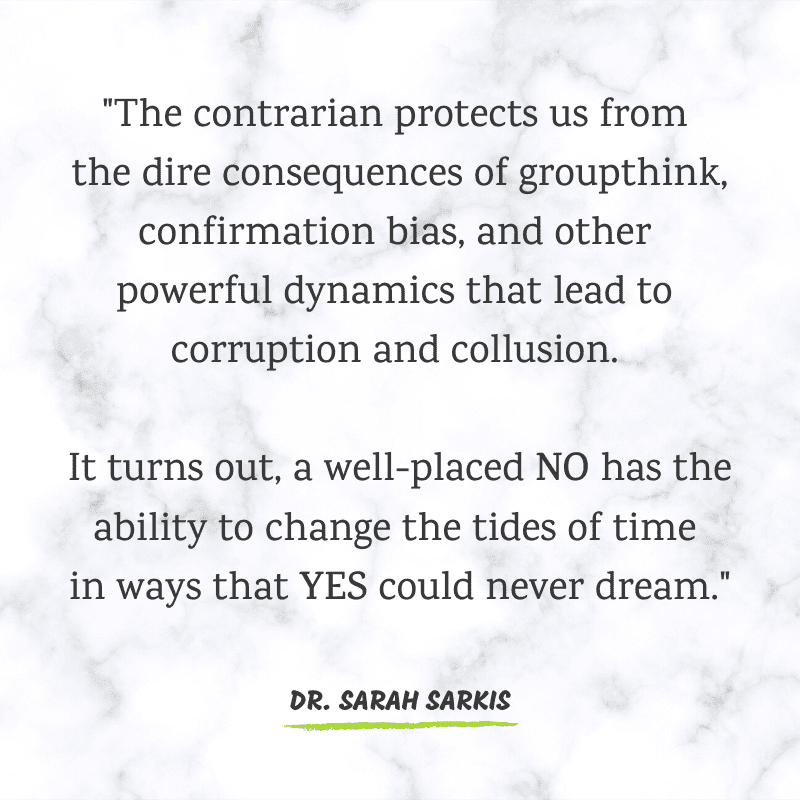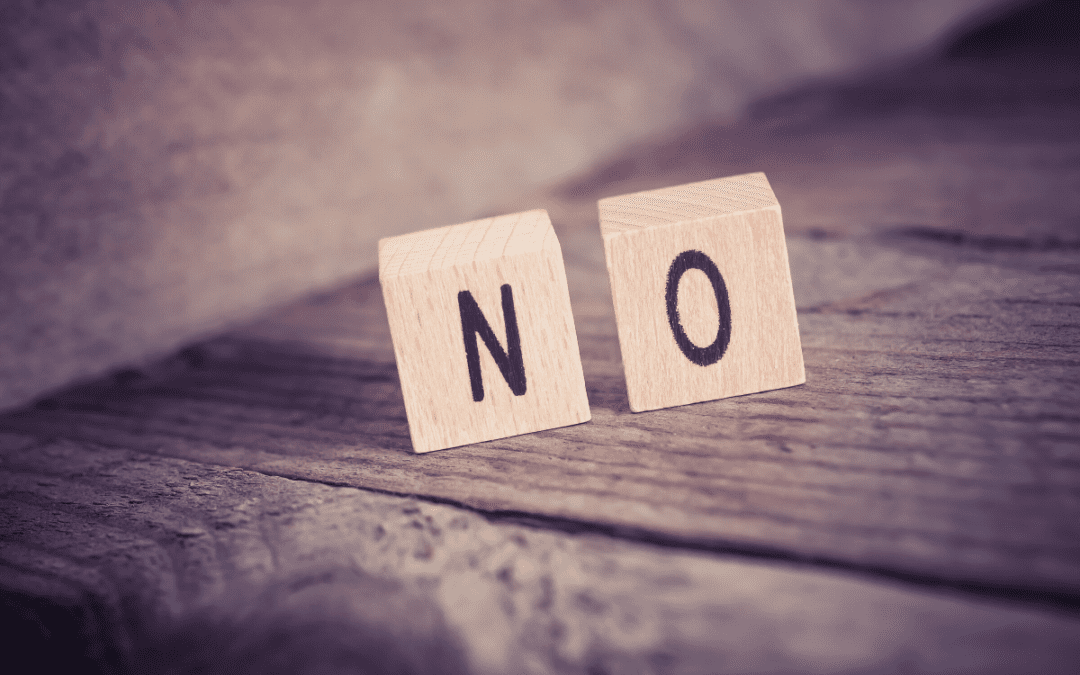Yes, is nice. It moves things along. It collaborates. It pleases. Yes is a smile and a wink.
But No is bold. It’s decisive. No takes on the status quo. The buck stops here.
And No carries burdens and pressures that Yes couldn’t possibly comprehend because it’s just so damn likable. No is hard to say, it’s hard to hear, and for some of us, it’s hard to honor.
Turns out, developmentally, No has to pass through two gates — first, we learn to say No to others. Then we internalize that ability to regulate the self. This two-pronged developmental approach has proven to be cumbersome, prone to glitches, and easily injured.
How you learned to say No to others, how it was received, and how you say No to yourself are at the epicenter of much of what I see coming in and out of my office.
In fact, the absence of No, when it’s most needed, lies at the root of so many of the epidemics currently unfolding in our society. Let’s take for example, the #Metoo movement. (Though this is merely one of many topics we could tackle using this lens such as the Catholic church scandal, economic crisis of 2008, etc.)
Think for a moment about the decades that unfolded where sexual harassment was the silent norm. Imagine the number of people whose lives were impacted by this collective commitment to maintain the silent status quo? As a shrink, who spent my early years studying sadomasochism in the forensic community, I am not actually shocked that people leveraged this system of complicity to hunt for victims. I wish I was surprised. But I’m not.
The truth is, learning to say No to ourselves has proven to be even harder than saying No to others.
I have witnessed the perils of this truth many times throughout my career as a psychologist.
What the #Metoo movement revealed was (yet) another example of just what is possible when we fail to say No to ourselves— to our every whim, our impulses, our greed, and our perversions. As a society, we get these reminders from time to time and yet, we always appear shocked when the seedy underbelly of our human potential is exposed.
And history has shown us, time and again, that just because you can, doesn’t mean you should.
That’s an important distinction; one that only No can tango with.
But what does intrigue me are those of us who enabled this epidemic; those who stood by silently, who “suspected” but didn’t feel like we could say anything. Yes, and its partners in crime, the silent objector, the disease to please, fear of retaliation, and complacency (to name only a few), kept these “industry secrets” rolling along despite its appetite for human consumption.
You see, Yes and No are always in partnership. You can’t actually have one without the other. When the collective Yes is to this type of status quo— exploitation, secrecy, and fear— the collective No becomes equally perverted. We end up saying No to safety, No to equality, and No to personal accountability.
That’s a big gamble with collective and individual consequences now coming home to roost.
At every organization and within every industry indicted in this epidemic, hundreds of people had to, in one way or another, “condone” this culture. That kind of cognitive dissonance and groupthink are always fed by Yes— Yes to status quo, Yes to secrecy, and Yes to turning a blind eye.
And by the way, before any of us mount our moral high horse, we have all done this in one way or another, in some part of our lives, at some point. I know the urge, trust me— to just go along, get along— because after all, No is such a lonely place when everyone around you is committed to Yes.

We all uphold these silent Yes’s in ways both big and small, micro and macro— and then we are shocked when our institutions, organizations, and political affiliations are exposed as complicit in these atrocities.
But history has shown us that it only takes one person— willing to stand up and say, no more, no way, no thank you— to disrupt the status quo. Many of the pivotal points in our shared history stand on the shoulder of this two-letter word— No.
Imagine for a moment, how different history would be without Rosa Parks.
That’s the power of No.
Perhaps now, you can see now why the contrarian holds a special and important role in every group, family, and organization (and why I always look for who plays this role in every group). They are designed to disrupt. No can be a pain in the ass. It’s hard to work with. It stands alone, defiant of the urge to “fit in” and “get along.” But the contrarian also protects us from the dire consequences of groupthink, confirmation bias, and other powerful dynamics that lead to corruption and collusion.
It turns out, a well-placed No has the ability to change the tides of time in ways that Yes could never dream. According to Dr. Adam Grant in his groundbreaking and provocative book, Give and Take, “The ability to say no is one of the most important skills one can have.”
And yet, most of the folklore and legend around No is associated with negative and difficult personalities; the rogue objector who thwarts progress and sours the collective morale. As a culture, we have managed to marginalized No to the point that there is a name for it when it starts to emerge in our kids— The Terrible Twos. This refers to the period when a typically developing child will master the verbal capacity to say No.
Psychologically and neurobiologically, this is an action-packed time, where multiple developmental intersections merge. This convergence of developmental achievements makes for an intense period of growth, where the child is learning the core principles related to autonomy, independence, and the critical distinction between self and other. These are not easy tasks. The Terrible Twos reflect this challenge, as the child begins to navigate their environment with a newfound and yet rudimentary, sense of agency and influence.
And with this capacity comes power.
No gives us the capacity to walk away, to negotiate, and to reinforce boundaries.
Many of your deepest patterns of self-regulation and sabotage orbit around this very intersection. The psychological components of your power struggles, your disease to please, your pathological accommodation, co-dependency, and addictive processes (to name only a few) spring from this developmental soil.
And why is this so important in the game of excellence, growth, and self-awareness?
Turns out, No cultivates clarity too. It operates as a steer and a guide. No allows us to self-regulate in ways that we can maximize time management, optimize our attention, and focus deeply on important tasks. These are the critical mico-steps you take in order to make yourself a priority.

No sets boundaries. It draws a perimeter through which we will not pass.
Imagine a world without those boundaries?
What does your relationship with No reveal about you?
Where are the gaps?
Where are you too rigid?
Where are you too permissive?
How does this translate to your family, your work, and your role as a leader?
This is the psychological landscape where people sabotage their own well-being. Remember, this is an inside job. I have said it before: this type of psychological work is not for the faint of heart. Enter at your own risk.
Until next time, stay curious.







This was just what I needed. Been working on the power and benefits of No for years and found myself slipping down the slippery slope of Yes recently. Thank you for the reminder!